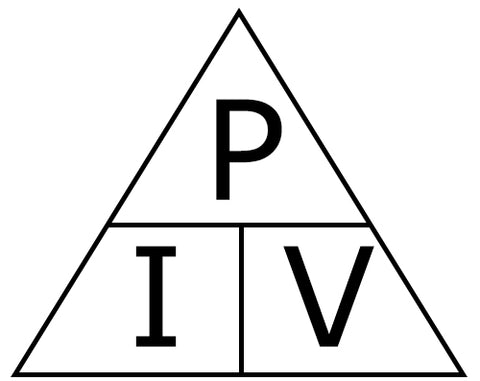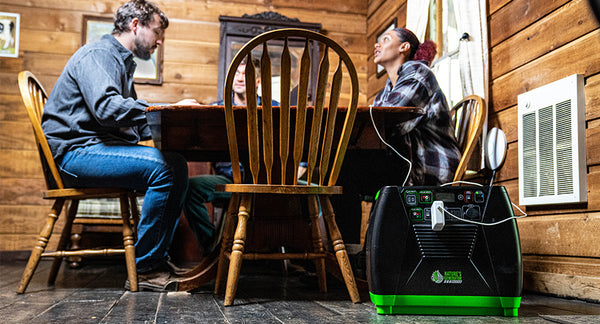Electrical engineers use Watt’s Law to ensure the safe and efficient operations of electrical systems. However, not a lot of people realize that homeowners also benefit from having a working knowledge of Watt’s Law. Understanding Watt’s Law can help them lower electricity bills, reduce energy waste, and prevent overloading circuits, electrical fires, or shocks. This article will help you understand Watt’s Law for your home’s proper electrical usage, safety, and maintenance.
What is Watt's Law?
Watt's Law was named after the Scottish engineer James Watt. He is renowned for his improvements to the steam engine in the late 18th century. While he may not have directly worked in electrical engineering, his innovations in steam engine technology had significant impacts on various fields, including electrical engineering.
At its core, Watt's Law shows the relationship between power (P), voltage (V), and current (I) in an electrical circuit. It states that power is equal to the product of voltage and current:
𝑃 =𝑉 × 𝐼
Power (P): It's how fast energy is used or made in a circuit, measured in watts (W).
Voltage (V): This is the electrical force that pushes electricity through wires, measured in volts (V).
Current (I): It's the actual flow of electricity through wires, measured in amperes (A).
In a nutshell, power shows how fast energy moves, voltage is the electrical push, and current is the flow of electricity.
Watt's Law Triangle
The Watt's Law triangle is a handy visual tool for quickly solving problems involving voltage, current, and power in electrical circuits.

To find power (P), multiply Current (I) by voltage (V)
P = I * V
To find voltage (V), divide power (P) by current (I)
V = P / I
I = P / V

Watt's Law in Everyday Life
The Watt's Law formula is versatile and applicable in different scenarios. It remains constant whether you're determining the power consumption of an appliance or sizing conductors for a particular load.
Electrical engineers use Watt's Law to figure out how much power is used or produced in electrical circuits. They use it to understand how voltage, current, and power are related in different parts of a circuit. This helps them design and analyze circuits, choose the right components like wires and resistors, and make sure everything works safely and efficiently. So, essentially, they use Watt's Law to make sure electricity flows where it needs to go and does what it's supposed to do in all kinds of electrical systems.
Additionally, Watt's Law allows homeowners to calculate the power consumption of household appliances, understand the electrical load on circuits, and determine the proper sizing of electrical components for home improvement projects.
For example, when calculating power usage, a homeowner might measure the voltage supplied by electrical outlets (typically 120 volts in the US) and the current drawn by an appliance, such as a refrigerator. Multiplying the voltage (120V) by the current (let's say 5 amps) yields the power consumption of the refrigerator, which is 600 watts. Knowing this helps homeowners lower their monthly bills because they can choose energy-saving appliances and use electricity wisely.
Also, homeowners can use Watt's Law to prevent overloading circuits and ensure electrical safety. For example, if a homeowner plans to install a new air conditioning unit, they would calculate its power consumption (voltage multiplied by current) and compare it with the capacity of the circuit it will be connected to. If the circuit's capacity is 15 amps and the air conditioner draws 12 amps, the homeowner knows they're within the safe limits of the circuit which helps prevent tripped breakers and potential electrical hazards.
Moreover, Watt's Law helps homeowners safely add new appliances or electrical devices to their homes. Let's say a homeowner wants to install recessed lighting in their living room. By calculating the power consumption of each LED light fixture (voltage multiplied by current), they can ensure that the electrical wiring and components are appropriately sized to handle the load. This prevents overheating of wires and ensures the safety and life span of the lighting system.
Overall, homeowners use Watt's Law to make smart choices, save energy, and keep their homes safe. They can use it for things like figuring out how much power their appliances use, making sure their circuits don't get overloaded, and for picking the right things for home projects.

Watt’s Law and Solar Energy Systems
Watt's Law, solar energy, and renewable products like Nature's Generator are all crucial for understanding and using solar power at home.
Watt's Law helps us gauge how much electricity solar panels can generate. This helps us determine the appropriate number of panels required and the optimal placement for installation.
Nature's Generator and similar products are essentially solar power systems, equipped with panels, a battery, and an inverter to turn sunlight into usable electricity. By applying Watt's Law, we ensure that the panels generate sufficient power to charge the battery effectively in order to meet your home's energy demands.
For example, you can use Watt’s Law if you want to see if Nature's Generator Elite works for your home’s electrical needs. This includes solar panels, a powerful battery, and an integrated inverter, providing an all-in-one solution for generating and storing solar energy.
Using Watt's Law, you can calculate the power output of the included solar panels. For instance, if the panels have a total power rating of 400 watts and receive an average of 5 hours of sunlight per day, we can estimate that they generate 2000 watts of electricity daily (400 watts x 5 hours).
Now, let's say you need an average of 1000 watt-hours of back-up electricity per day. Watt's Law helps us ensure that solar panels are capable of producing enough power to meet this demand.
With this understanding, you can confidently choose Nature's Generator Elite, knowing that it can effectively generate the energy needed to power your home. If you want to know which product is for you, please contact our team today.
Understanding Watt’s Law is crucial not only for electrical engineers but also for people who want to optimize their home’s electrical usage, safety, and maintenance. Understanding the basics of Watt’s Law allows homeowners to make informed decisions about their usage, lower electricity bills, prevent overloading circuits, and ensure the safe installation of electrical components in their homes.
* We want to give credit where credit is due. Professional writer, Shobe Cruz, contributed research and content to this blog titled: What is Watt's Law Thank you, Shobe, for your contributions!



